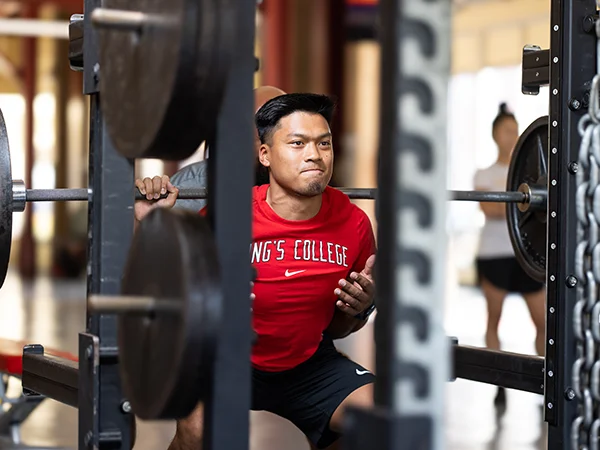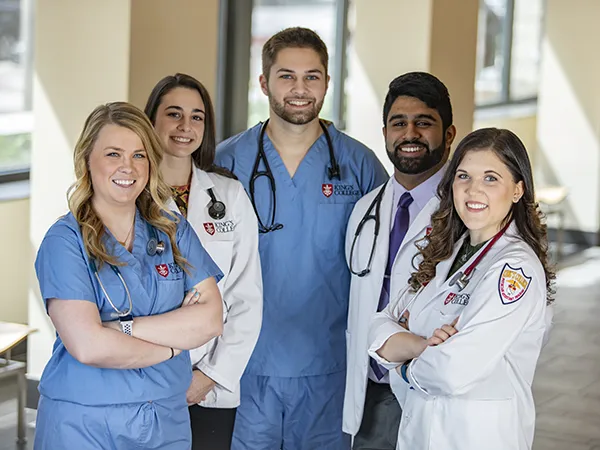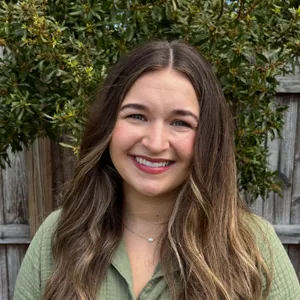Nutrition and Dietetics

Program Overview
Food plays a vital role in overall health and wellness, making the field of nutrition and dietetics especially important in today’s health-conscious world. The fully online M.S. in Nutrition and Dietetics (MSND) Future Graduate Program at King’s College, which is located in Wilkes-Barre, Pa., prepares students for evidence-based practice in the field of nutrition. With your MSND, you can use your advanced knowledge about food and science to provide nutrition education and counseling to people who want to live healthier lives.
Our part-time master’s degree in nutrition and dietetics prepares students for the national exam to become a Registered Dietitian Nutritionist (RDN)—a recognized professional title and credential. As of January 2024, a master’s degree is required to take the credentialing exam.

What Can You Do with a Master's Degree in Nutrition and Dietetics?
RDNs can work in various environments, including clinical settings, fitness centers, nursing homes, universities, private practices, and more. They play a crucial role in promoting health through nutrition, helping individuals manage chronic diseases, and improving overall wellness. As an RDN, you will support people with food counseling, personalized meal and nutrition plans, education on healthy eating, and more.
The median salary for RDNs is $79,000 per year, according to the Compensation & Benefits Survey of the Dietetics Profession, Academy of Nutrition and Dietetics, 2024.
Opportunities for these positions are growing faster than average, driven by increasing awareness of the link between nutrition and health. As the demand for dietary guidance rises, RDNs are well-positioned to make a significant impact in various settings, including corporate wellness programs and community outreach initiatives.

What Makes the King's Nutrition Program Different?
Our online master's degree in nutrition and dietetics emphasizes critical thinking and uses interactive technology to engage students in the learning process. We designed this program to be flexible and convenient for students to learn from our faculty on their schedule.
Gain a competitive edge in the dynamic fields of nutrition and dietetics with a diverse, science-driven curriculum that reflects the latest research and aligns with current professional opportunities. Through our program, you will:
- Study on your own schedule. Our online program is adaptable and convenient, so you can work around your schedule.
- Gain hands-on experience in the field. Our program includes 1,100 Supervised Experiential Learning hours, including real-world professional experience rotations.
- Stand out in the workplace. A rigorous, evidence-based curriculum will prepare you to be an effective RDN in your first post-graduate professional position.
- Learn from the best. Our courses are led by experienced, highly trained faculty with diverse backgrounds. They are also active working professionals involved in cutting-edge research.
Upon successful completion of the program and all requirements, you will receive your MSND degree and a Verification Statement allowing you to sit for the Commission on Dietetics Registration (CDR) RDN exam.

I studied finance but decided I wanted to become a registered dietitian. In the King's MSND program, I needed to put more time into understanding certain concepts, but it was worth it. In hindsight, I wouldn't change anything about my journey to becoming a registered dietitian. If you're passionate about learning evidence-based nutrition and sharing that with others, consider this program!

MSND Program Accreditation Status
King’s College’s M.S. in Nutrition and Dietetics Future Graduate Program has been granted candidacy for accreditation by the Accreditation Council for Education in Nutrition and Dietetics (ACEND) of the Academy of Nutrition and Dietetics, 120 South Riverside Plaza, Suite 2190, Chicago, IL 60606-6995, (312) 899-0040 ext. 5400. Visit the ACEND webpage here.
Contact Dr. Diane M. DellaValle, dianedellavalle@kings.edu or (570) 208-5900, ext. 5444 for more information.
*The Accreditation Council for Education in Nutrition and Dietetics (ACEND) released the Future Education Model Accreditation Standards for programs in nutrition and dietetics. These accreditation standards integrate didactic coursework with supervised experiential learning in a competency-based curriculum designed to prepare nutrition and dietetics practitioners for future practice.
This is an online program. There is no in-residence or on-campus requirement.
**Outcome data for our Future Graduate Program will be available upon request.
Important Program Information
Program Mission, Goals, and Objectives
Mission of the MSND Program
We are dedicated to preparing graduate-trained Registered Dietitian Nutritionists (RDNs) who will have the knowledge and skills to promote our profession of the science of Nutrition and art of Dietetics in a variety of practice areas.
Program Goals and Objectives
Program Goal 1: Program Graduates will be prepared practitioners in a variety of RDN positions in the field of nutrition and dietetics.
Program Objectives Supporting the MSND Program Goal #1:
- At least 80% of program graduates who respond to the alumni survey will indicate that they are engaged in actions that enhance the quality of life, reduce health disparities, and/or protect human rights in and around their community.
- At least 80% of program graduates take the CDR credentialing exam for dietitian nutritionists within 12 months of program completion.
- Of graduates who seek employment, at least 80% are employed in nutrition and dietetics or related fields within 12 months of graduation.
- The program’s one-year pass rate (graduates who pass the registration exam within one year of first attempt) on the CDR credentialing exam for dietitian nutritionists is at least 80%.
- At least 80% of graduates will report they were adequately prepared to be an effective RDN practitioner in their first post-graduate professional position.
- At least 80% of employers who respond to an “Employer Survey” will select “strongly agree” or “agree,” indicating graduates were adequately prepared to be an effective entry-level RDN practitioner in their first post-graduate professional position.
- Employers will indicate that graduates hired were very well or well-prepared to advance the practice of Dietetics.
Program Goal 2: Program Graduates will be connected to the community as socially responsible RDN practitioners.
Program Objectives Supporting the MSND Program Goal #2:
- At least 80% of program graduates who respond to the alumni survey will indicate that they are engaged in actions that enhance the quality of life, reduce health disparities, and/or protect human rights in and around their community.
- At least 80% of employers surveyed will indicate that graduates hired were very well or well-engaged in actions that enhance the quality of life, reduce health disparities and/or protect human rights in and around their communities.
Nutrition Program Philosophies
Throughout our graduate curriculum, we teach and model the Total Diet Approach, which is the notion that the overall dietary pattern of foods eaten is the most important focus. This means that everything a person eats “averages out” over time, and that is the combination of ALL foods and drinks that gives people energy and nutrients to meet their individual needs.
We do not eat nutrients. We eat foods. Foods give us so much more than nutrients: they are a part of our culture and foods and give us enjoyment and a sense of belonging. Our food system is integrated into almost every aspect of our life. As such, foods should not be used as a means to an end (e.g. used to accomplish a goal), but as an end (e.g. valued for its own sake or its own value).
This also means that all foods can fit in a balanced dietary pattern. There are no good foods or bad foods, just foods. Foods have no moral value.
Body acceptance and inclusivity are important and that means respecting different body sizes and shapes, understanding that body weight/shape have no moral value, and that body weight is not the only indicator of health status. We need to be aware of implicit weight bias.
Application Requirements
Prerequisites
To be eligible for our Future Graduate Program, applicants must have earned at least a Bachelor's degree from a US regionally-accredited college or university.
For applicants from foreign institutions, documentation must be provided that their academic degree has been validated as equivalent to the bachelor's or master's degree conferred by a US regionally-accredited college or university. Applicants from foreign institutions should visit the ACEND website for more information including links to independent foreign degree evaluation agencies. Applicants whose native language is not English must take and pass the TOEFL exam or complete a bachelor’s degree at a US College or University. Official TOEFL scores must be sent directly to the King’s College Graduate Admissions and received by the application deadline. The minimum TOEFL Score needed to apply is 108/120 on the internet-based test.
Required Prerequisites:
- Successful completion (B or better) of Anatomy & Physiology I and Anatomy & Physiology II (no labs required; all body systems need to have been covered)
- Successful completion (B or better) of Organic Chemistry (no labs required)
- Successful completion (B or better) of Biochemistry (no labs required)
- All prerequisite courses must be taken for course credit and for a course grade at an accredited institution of higher learning.
- Undergraduate GPA of 3.0 or better
Application Requirements
All prerequisite course work, including official transcripts and all application requirements, must be complete and uploaded at the time of application submission. In addition to King’s College’s Graduate Admissions Application, the FG MSND Program requires the following:
- A current resume or curriculum vitae (CV)
- (3) Academic and/or professional references
- A 1000 word personal statement detailing the following:
- Why the applicant is applying to this particular FG MSND program at King’s College
- Why the applicant wants to enter the dietetics profession
- Experiences that have helped to prepare the Applicant for a career in nutrition/dietetics
- The applicant’s short- and long-term goals
- The applicant’s strengths and challenges needing improvement
Applicant Selection Process
Complete graduate applications are scored based on GPA (including cumulative GPA and overall science and prerequisite GPA). Additional points are awarded for advanced degrees, graduate course credits, relevant coursework (earning a B grade or better), professional work, volunteer work, and other experiences. The quality and quantity of any health care experience or shadowing hours are also scored.
Your personal statement, CV/resume, references, and other experiences (work experience, community service, and extracurricular activities) included on your application are also scored, in addition to general communication and following of instructions throughout the application process (such as formal and informal interactions with program faculty and graduate admissions staff). The King’s College graduate admissions staff and nutrition programs faculty will notify selected candidates by the schedule outlined below under “Application Deadlines.” A mandatory virtual orientation is held the August before Fall classes begin.
Meeting minimum prerequisites does not guarantee admission. Once accepted, graduate applicants will be required to submit a non-refundable deposit to secure their seat. This deposit will then be applied to their tuition.
Application Deadlines
-
Application opens August 15, 2025
-
Application deadline is January 15, 2026
-
Applications are reviewed from January 16 to January 26, 2026
-
Applicants are notified of decision by March 1, 2026
-
Applicants need to accept or decline by March 15, 2026
-
Waitlist notifications are sent out March 16, 2026
-
Applications must be made through DICAS here.
If you have any questions, please contact Graduate Admission at gradprograms@kings.edu or (570) 208-8519
Schedule a virtual meeting with Dr. Diane DellaValle, Nutrition Program Director to learn more about the program!
Becoming a RDN
The MSND FG Program provides the education and training necessary to become a Registered Dietitian Nutritionist (RDN). Completion of educational programs and supervised experiential learning (SEL) that are ACEND-accredited is required for the training to become a Registered Dietitian Nutritionist. Our program has been granted candidacy status by the Accreditation Council for Education in Nutrition and Dietetics (ACEND) of the Academy of Nutrition and Dietetics, and is designed to be undertaken after completion of a baccalaureate degree from an accredited college university and completed prerequisites. Read more information about educational pathways to become a RDN here.
Effective January 1, 2024, the Commission on Dietetic Registration (CDR) will require a minimum of a master’s degree to be eligible to take the credentialing exam to become a registered dietitian nutritionist (RDN). In order to be approved for registration examination eligibility with a bachelor’s degree, an individual must meet all eligibility requirements and be submitted into CDR's Registration Eligibility Processing System (REPS) before 12:00 midnight Central Time, December 31, 2023. For more information about this requirement visit CDR's website: https://www.cdrnet.org/graduatedegree.
King’s College’s M.S. in Nutrition and Dietetics Future Graduate Program has been granted candidacy for accreditation by the Accreditation Council for Education in Nutrition and Dietetics (ACEND) of the Academy of Nutrition and Dietetics, 120 South Riverside Plaza, Suite 2190, Chicago, IL 60606-6995, (312) 899-0040 ext 5400. http://www.eatrightpro.org/ACEND.
Graduates who successfully complete an ACEND-accredited FG program are eligible to take the CDR credentialing exam to become an RDN. The Registration Exam requirements are set by the Commission on Dietetic Registration (CDR). After successfully passing the Registration Examination, graduates can practice as Registered Dietitian Nutritionists (RDNs). In order to maintain registration, graduates must complete continuing professional educational requirements. In most states, graduates also must obtain licensure or certification to practice.
The Board of Registration of Dietitians/Nutritionists grants licenses to qualified individuals who comply with the requirements of the statute. The Board also insures that licensees have complied with continuing professional education requirements necessary to maintain current knowledge and renew their license. More information about state licensure requirements is available here.
Program Costs and Financial Aid
Tuition for the 2025-2026 academic year is $848 per graduate credit.
- Graduate Year 1 Tuition: 21.0 credits max* (includes thesis) totaling $17,808
- Graduate Year 2 Tuition: 21.0 credits max* (includes thesis) totaling $17,808
Total Graduate Tuition is $35,616 maximum*.
*The cost of two years of tuition without completing the optional research thesis and traditional real work professional environment (RWPE) schedule (39 total credits) = $32,253
Program and other fees and expenses not included with tuition:
- Laptop computer: $1,500
- Virtual food labs: $250
- Clothing required for supervised experiential learning: $220
- Name Tag for SEL: $10
- Drug test: $100
- Medical exam: $200
- Professional liability insurance: $30/year (obtain online): $60
- Academy of Nutrition and Dietetics student membership: ($58 per year): $120
- Background check fees: $50
- Textbooks: $1,600 (includes ServSafe Manager training and Exam; RDN Exam review; eNCPT subscription; case study platform)
- Total program and other fees: $4,100
Total maximum estimated cost for two years, including tuition and fees: $43,826
Financial Aid: King’s College does not provide financial aid to graduate students. However, you can still apply for private loans as well as federal and state financial aid. You must complete the FAFSA to apply for federal loans. If you have questions about tuition and fees, contact the Business Office at (570) 208-5851 or businessofficestaff@kings.edu. For information on financial aid, contact the Office of Financial Aid by phone at (570) 208-5876 or by email at finaid@kings.edu.
Students are responsible for researching and applying for alternative loans. You may borrow up to the total cost of attendance not covered by other financial aid. We encourage you to compare multiple lenders and loan terms for the one that best fits your needs.
Academy Foundation Scholarships are also available through an Academy student membership, which our graduate students must acquire and maintain throughout the program. For more information about these scholarships, please visit this website.
Graduate tuition and fees listed apply to the 2025-2026 academic year. Tuition and fees can increase each academic year based on economic conditions. Tuition has increased by an average of 2.5% each academic year over the past 5 academic years. Students can use this information to estimate their tuition cost for subsequent years based on the respective program-specific per-credit cost listed on this webpage. Estimates calculated using this method are not meant as projections; actual future tuition costs will vary from estimates.
Curriculum and Program Options
The King’s College Master of Science in Nutrition and Dietetics (MSND) Future Graduate program is conveniently designed to be completed in two years on a part-time basis. Courses in the MSND program are shorter than a traditional 16-week semester, with each one broken into two seven-week mini-semesters. Completing the program requires 39-42 credit hours, depending on student goals.
The optional thesis schedule is shown below. Students should begin their thesis by the Summer of their first year to complete their research on time.
New students are admitted in the fall. Visit the King’s College Academic Calendar to find key dates and deadlines for each accelerated semester. However, it may be necessary to work outside the Academic Calendar during RWPE supervised experiential learning (SEL) depending on site placement, facility hours, and preceptor availability.
Curriculum and degree requirements are available here.
Assessment of Prior Learning
While the stated prerequisites would not satisfy any of the competencies or performance indicators, graduate students may request to have an assessment of prior learning (e.g., meeting of required competencies, required by our accrediting body, ACEND) after admission to the MSND Program. The graduate student needs to be able to demonstrate which competencies were met by the course or experience, and how that course or experience meets the required competencies. This is done by request, after admission to the MSND Program, and all requests are considered on a case-by-case basis.Only graduate-level courses or experiences that have taken place within the last five years (and graduate-level courses successfully completed at regionally accredited U.S. universities*, taken for course credit and for a course grade) will be assessed for attainment of required competencies upon request.
For work experiences to be eligible for assessment, graduate students must meet all the following criteria:
- Minimum of 2000 hours of the work experience to be assessed (this is about 12 months full-time)
- Work experience to be assessed must have been accrued under the supervision of a professional qualified to work in the field
- Work setting must have been in a clinical, public health, food service, or community setting
- Work experience to be assessed must have been accrued within the previous 5 years
- Examples: Public health/WIC Nutritionist; Food Service Directors or Managers; Dietetic Technicians, Registered (NDTR)
The following examples would not be eligible for assessment of prior learning:
- Undergraduate courses or course-related practicum or experience
- Food distribution volunteer at a food bank
- Personal trainer at an athletic facility
- Owning a nutrition, health, or wellness coaching business
- Any self-employed experience
- Experiences over 5 years ago
The following materials would be required documentation for a prior learning assessment to be considered for attainment of competencies:
1. An official transcript demonstrating a grade of B or higher in the course and showing the year the course was taken.
2. A detailed syllabus for each course detailing the learning activities in English.
3. A complete resume or CV which can identify the work experience, company/facility, dates of employment, total hours in position, position title, description of your position (including purpose, major responsibilities, functions, and what and how work was performed).
4. The competencies and performance indicators the student have identified as being met by her/his prior learning/experiences.
5. Provide samples of your work to support that the competencies were met. Examples include but are not limited to: projects, reports, seminars or presentation, audits, in-service sessions, marketing content, menu or recipe review/development webinars, educational materials, lesson plans, budget reports, training certificates, performance appraisals, and licenses. Additional information may be requested. Materials must be submitted within 1 week of the request.
6. Self-reflection on each learning experience, which would be included in her/his required digital reflective e-portfolio.
*For MSND Students entering with degrees from non-US Institutions, a course-by-course evaluation by a credential evaluation agency is required to assess equivalency.
Future Graduate Model Program Accreditation
King’s College’s M.S. in Nutrition and Dietetics Future Graduate Program has been granted candidacy for accreditation by the Accreditation Council for Education in Nutrition and Dietetics (ACEND) of the Academy of Nutrition and Dietetics, 120 South Riverside Plaza, Suite 2190, Chicago, IL 60606-6995, (312) 899-0040 ext 5400. Visit the ACEND webpage here.
Contact Dr. Diane M. DellaValle, dianedellavalle@kings.edu or 570-208-5900, ext. 5444 for more information.
*The Accreditation Council for Education in Nutrition and Dietetics (ACEND) released the Future Education Model Accreditation Standards for programs in nutrition and dietetics. These accreditation standards integrate didactic coursework with supervised experiential learning in a competency-based curriculum designed to prepare nutrition and dietetics practitioners for future practice.
This is an online program. There is no in-residence or on-campus requirement. *Outcome data for our FG Program will be available upon request.
Graduation and Program Completion Requirements
To receive the Verification Statement and be eligible to sit for the Registered Dietitian Nutritionist (RDN) credentialing examination, the MSND FG Program requires that the students complete the required graduate courses and:
1. Obtaining all previous undergraduate and/or graduate transcripts, demonstrating attainment of degree.
- Documentation of successful completion of required prerequisites.
- Complete the required MSND coursework, including successful demonstration of all required competencies* (maintaining a grade point average of 3.0 and/or B or better in each course) within no more than 3 years of matriculation (150%).
- Complete all competency-based assessments, and no less than 1,100 hours of SEL (no less than 700 h in RWPE) incorporated throughout the program, and ALT SEL into all courses. You may do more than this minimum.
- Complete and submit self-evaluation of performance and experience after each RWPE SEL, which will be included in the required digital reflective ePortfolio.
- Meeting all objectives for required coursework, including satisfactory completion and evaluation of all RWPE SEL rotations, course assignments, and following all policies and procedures of the King’s College MSND FG Program.
- Submit the final digital reflective ePortfolio that documents attainment of required competencies, as a required component MSND FG Program.
- Complete and submit final program evaluation upon completion of all RWPE SEL and didactic requirements.
*Meet all ACEND® competencies prior to completion of the program. These competencies specify what every registered dietitian nutritionist (RDN) should be able to do at the beginning of his/her practice career. The core competency statements build on appropriate knowledge and skills necessary for the entry-level practitioner to perform reliably in the professional practice setting
Upon successful completion of the FG program, the student will receive a Verification Statement and the student’s information will be submitted to the Commission on Dietetics Registration (CDR) for eligibility for the RDN exam. The Verification Statement and submission to CDR will not be provided until all the above requirements are met.
The MSND FG program is designed to meet the educational requirements for the State of Pennsylvania. Determinations regarding professional licensure and certification eligibility associated with this program are outlined below.
- The Program meets the educational requirements for professional licensure and/or certification as an entry-level registered dietitian in the following states: Alabama, Alaska, Arkansas, Connecticut, Delaware, Washington DC, Florida, Georgia, Hawaii, Idaho, Illinois, Indiana, Iowa, Kansas, Kentucky, Louisiana, Maine, Maryland, Massachusetts, Minnesota, Mississippi, Missouri, Montana, Nebraska, Nevada, New Hampshire, New Jersey, New Mexico, New York, North Carolina, North Dakota, Ohio, Oklahoma, Oregon, Pennsylvania, Rhode Island, South Carolina, South Dakota, Tennessee, Texas, Utah, Vermont, Washington, West Virginia, Wisconsin, and Wyoming.
- Since no licensure or certification exists in some states, a determination has not been made as to whether the program meets the educational requirements for professional licensure and/or certification as an entry-level registered dietitian in: Arizona, California, Colorado, Michigan, and Virginia.
Student-identified Supervised Experiential Learning (SEL) Guide
It is the graduate student’s responsibility to locate SEL sites and preceptors in the geographic location in which they desire to complete the SEL, however, the MSND Program Clinical Coordinator is available for guidance throughout this process and can aid students in identifying appropriate sites and preceptors. It will be important for the graduate student to be flexible, and or the graduate student to research the geographic location in which s/he wishes to complete the SEL. If this is in an area that is “saturated” with other nutrition and dietetics students and interns, you may need to consider other nearby sites/facilities in areas that are less likely to receive SEL requests. Graduate students may need to consider dividing SEL hours between a few different facilities (keeping in mind the 10 h minimum per week, per site/facility, per preceptor rule), or offer to complete SEL hours on the weekends. if the site and preceptor can accommodate them for this type of schedule.
The MSND program has structures in place to assist both prospective and matriculated graduate students in securing SEL sites, including a database that the Clinical Coordinator can use to help assist graduate students locate sites in their area; this database includes pertinent sites (i.e. hospitals, clinics, outpatient practice centers) with previous affiliation agreements from other King’s College SEL-required Health Sciences programs such as the Master of Science in Athletic Training and Master of Science in Physician Assistant Studies programs, as well as sites with previous regional affiliation agreements with the on-campus Nursing Program. This database will be maintained to include additional sites that MSND graduate students have utilized successfully as that information becomes available. The database will be kept up to date by the MSND Clinical Coordinator, under the guidance of the MSND Program Director. The MSND program is also currently working with, and will pursue ongoing contact in support of, SEL opportunities at national and regional sites such as the VA system, WIC/MFHS and Highmark Health, and will provide regional contact information to prospective and matriculated graduate students who experience challenges locating adequate sites at which to complete their SEL hours.
Further, matriculated graduate students are required to join the Academy of Nutrition and Dietetics upon enrollment in their first course, which will allow them to access the list of ACEND preceptors via the ‘Find A Preceptor’ tool on the Academy website. The graduate students will be monitored closely and continuously throughout the program to ensure that the academic experience is only slightly impacted if attaining sites proves challenging.
The MSND Clinical Coordinator will be actively involved with prospective graduate students that have met the pre-requisite requirements for admission and will guide graduate students with developing a timeline and process for acquiring sites and preceptors, as well as affiliation agreements, for the MSND FG program.
While the graduate student is responsible for finding and securing their own SEL sites, the MSND Program Clinical Coordinator is available for guidance throughout this process and can aid graduate students in identifying appropriate sites and preceptors. In all cases, it is required that the graduate student communicate with the Program Director and Clinical Coordinator, in order to be supported to the greatest extent possible by the MSND Clinical Coordinator and Program Director to identify potential SEL sites and negotiate successful affiliation agreements with these sites, however it remains the graduate student’s responsibility to identify and locate appropriate sites, and travel to/from their site, or if necessary, temporarily relocate to an appropriate SEL site location.
If the graduate student is not able to find suitable sites, the following procedures will be adhered to:
If a graduate student has challenges as addressed above, possible alternatives to support the graduate student in completing the required SEL include:
- approval of alternate learning experiences that allow for assessment of attainment of the specified competencies (this option would adhere to current ACEND guidance regarding alternate SEL experiences, and would not exceed the amount allowed by ACEND)
- approval of off-schedule SEL hours to offset a disruption, for instance completing 20 hours in one week or completing hours during the evening or on weekends
- completing hours at telehealth sites, or other actual SEL sites that offer remote options to attain required competencies
Graduate students may need to consider dividing clinical hours between a few different facilities (keeping in mind the 10 hours minimum per week, per site/facility, per preceptor rule), or offer to complete SEL hours on the weekends or evenings to complete SEL requirements. The Clinical Coordinator of the MSND program will help as much as possible, but the graduate student is responsible for finding all SEL sites and preceptors in a geographic location suitable to the student if SEL hours are disrupted.